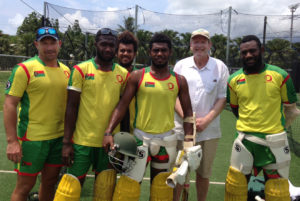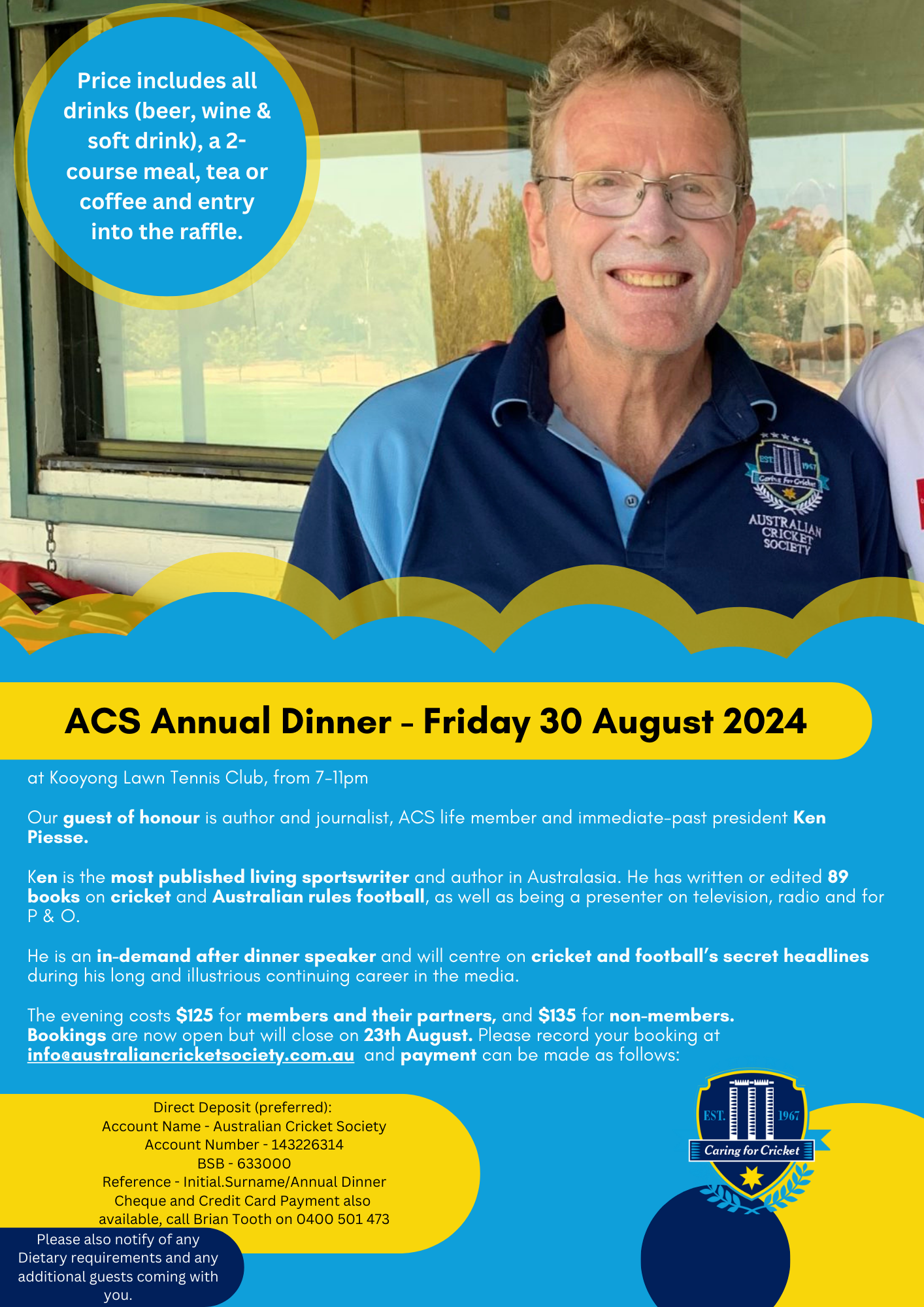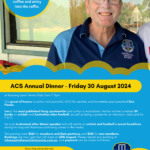Vanuatu can be a stunning South Pacific base for cricket, says ACS president KEN PIESSE
 Mid-morning in Port Vila and the temperature is a hot and steamy 35. Even the locals are perspiring.
Mid-morning in Port Vila and the temperature is a hot and steamy 35. Even the locals are perspiring.
Vanuatu’s national team coach Shane Deitz speaks staccato style: ‘Enjoy it lads. Throw-downs today. Lots of shots. Have fun.’
The enthusiasm and passion for the game in this idyllic South Pacific cricketing outpost is extraordinary and the numbers continue to swell despite no turf, little tv, a massive shortage of equipment and rudimentary facilities which force the team to play all their representative matches offshore.
A combined Vanuatu and Papua-New Guinea team recently competed at the Australian national country championships in Geraldton, beating combines from Queensland, Victoria, SA and WA to finish a most respectable third.
With more government, local and international backing, allowing for the building of a new $A500,000 international cricketing base, Deitz is sure that Vanuatu can continue to progress and enhance its rating among the World Cricket League’s ‘associates’ countries, perhaps even emulate the deeds of Afghanistan and qualify for a World Cup.
Since 2012 the team has lifted its ranking from Division 8 to Division 4 and has two of its leading players currently involved at premier club level in Australia: Andrew Mansale at Deitz’s old Adelaide club Southern Districts and Patrick Matautaava at Essendon in Melbourne.
‘Our kids are magnificent natural athletes, so light on their feet,’ says Deitz.
‘They have a dream just like everyone else of improving. They are hungry for information, want to succeed and are so proud and passionate about representing their country.’
Only half his squad is present this morning. Some were still to return from Australia. One is ‘AWOL’ ferrying guests from the just-arrived P & O cruise ship, Pacific Jewel. After practice, as he shows us around the town, Deitz sees him at the local servo. ‘Where were you maan?’ he gestures. As we drive off again, he explains, ‘His family are busy down the wharf. It’s always flat out here when the cruise ships come in. He’ll be ok again for our afternoon session.’
The squad trains up to eight and nine times a week, Monday to Friday, skills in the mornings and strength and conditioning in the afternoons. In April they participated in the ICC World Cricket League Division 4 tournament, a six-team Fifty50 competition in Kuala Lumpur.
Currently the team plays only Twenty20s. A supply of new white leather balls brought back from Perth are eagerly commandeered, the boys laughing to each other and quipping how they are going to ‘reverse swing you maan’ and ‘knock your castle over’.
Many of the team speak only the local lingo Bislama with only a few words of broken English. It makes Deitz’s role particularly challenging.
He’d been appointed in 2015 for his ‘new-age’ coaching skills. He wants his lads to play like David Warner, not Bill Lawry. He’d won the job ahead of an Englishman who was intent to apply the MCC coaching manual.
‘Cricket is advancing so quickly,’ says Deitz, ‘and coaching has to keep up.’
‘Ask Greg Chappell about how his methods have changed over the same journey I’ve been playing and coaching. I’m sure they would have done just about a complete 360 since he coached us at South Australia.’
The team’s nets just outside the ‘CBD’ had been down for just a week before a cyclone hit in March 2015, necessitating an immediate rebuild.
By western standards the rest of the facilities are dilapidated and the main ground pot-holed by land crabs the size of one’s hand, making any meaningful fielding practice impossible. The much-used centre hard wicket has weeds growing where the stumps would be.
Their kit is housed in a shipping container, near a cyclone-proof open carousel, used by the players as a change room.
The boys all train in their bright yellow Vanuatu t-shirts and listen intently to 42-year-old Deitz, their lifeline to the outside cricketing world.
Early on when one hit a cover drive without bothering to move his front foot towards the ball, I suggest he would have timed it even better by playing in a more orthodox fashion. Deitz steps in immediately. ‘No Ken’ he says ‘that’s old school. We want them to throw their hands at the ball like Davey Warner, really getting their full body into the shot. We’re playing only Twenty20s at the moment. Scoring is everything. Fast hands. Big wrists.’
The language barrier and the technical issues could be a complication. But Deitz is amiable, caring and speaks on their level, showing the squad what he wants. He downplays technique and forever champions their athleticism and flair.
‘If I tell one of the lads how he is hitting across the line, he’ll have no idea what I am getting at,’ he says.
‘Instead I’ll get him to work out naturally and instinctively how to hit the ball into specific areas. We’ll play games with no extra runs say for hitting to cow corner but 10 to straight hit and leave it to the boys to work out how to get it there. They are very instinctive.’
Deitz is a much-travelled and credentialed career coach whose CV includes time in Bangladesh and New Zealand. He says living in Vanuatu is ‘sheer paradise’. ‘Everyone wants to come here because of its natural beauty and all the activities. Vanuatu is such a stunning holiday destination and makes us so optimistic about cricket’s on-going future here.’
Among the ex-pats driving the game in this South Pacific wonderland are ex-Melburnian Mark Stafford, president of the Vanuatu Cricket Association and his right hand man, board member Garry Blake, born in Vanuatu and schooled in Sydney.
They see the team’s home base at Independence Park overlooking the spectacular harbor as the ideal base for a new ground.
Currently it is on an overgrown grassy slope with a narrow walking track running through the middle. ‘We have a new curator about to start,’ says Stafford. ‘As we say in these parts he’ll be there Monday.’
Like Deitz, Stafford’s enthusiasm for progress is driven by the passion of the players. ‘Our boys and girls are naturals and love the game so much,’ he says.
‘Cricket is second only behind football (soccer) as our preferred sport. Many in our national squad also act as development officers taking the game to the schools. On arrival they are feted like heroes. They love it just as much as the kids.’ (the officers received Vanuatu’s basic wage of just $A400 per month)
Stafford says up to the age of 9 and 10, he would back the natural skills of the local boys and girls against any similar age group wherever cricket is played. But the lack of infrastructure, coaching and equipment issues and skyrocketing travel expenses complicate their advancement. The International Cricket Council, which helped fund the nets, can do only so much.
There are almost 20,000 official cricket participants in Vanuatu, the majority in Port Vila and some on neighbouring islands Santo, Tanna and Malekula, all at least a day away by boat. Six of the eight Vanuatu Cricket Association clubs also have Under 19s and Under 15s. There is an acute shortage of gear and shoes are often shared between four and five. And there are very few television sets on which to watch the big names from overseas.
Every overseas carnival costs Vanuatu cricket $A10,000, before flights and food. Hosting local matches on turf is currently a bridge too far. Instead Deitz is hoping to implement a hybrid artificial wicket he has seen in Dubai. ‘It plays just like a turf wicket without the wear and tear,’ he says.
At our practice one of the lads, ‘Simmo’ bowled in thongs and a Batman t-shirt, yet barely missed a length. Another spinner, 18-year-old Willie Nalisa had a big leg break and an excellent wrong-un.
The average age of the squad is 22-23 and Deitz has a nickname for them all. Some printable, some not so.
Originally from Bankstown, he had 10 years in the South Australian Shield team. He’s proud of his five first-class centuries including the slowest ever in a Sheffield Shield match in Melbourne (‘we were trying to save the game’) and two first-class wickets, both in Brisbane. ‘It should have been three. Dizzy (Jason Gillespie) dropped a sitter at slip. I still ask him what he was doing there.’
The Associates’ qualifying rules have been altered and Deitz is looking to make his international debut in Malaysia in April, allowing for the continuing improvement in his mobility after a recent full hip replacement.
Having lunched on the local favorite poulet fish, we hopped back in Shane’s ute and headed for the Harbor. ‘We had 19 in the car once,’ he said, ‘seven or eight in the cabin and the rest standing-up up in the tray. It’s our PB… so far. We also pack the tray with ice for ice baths for rehab after sessions and matches.’
We shake hands and he says: ‘Don’t forget to remind everyone that we’re just three and a half hours from Sydney… when did you say you’re coming back? We’d love it if you could bring a team with you next time. Everyone will love it. It’s paradise here… pure bliss.’
- Ken Piesse travelled to Vanuatu courtesy of P&O…#likenoplaceonearth


